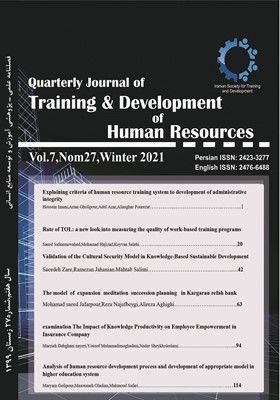Explaining criteria of human resource training system to development of administrative integrity
Subject Areas : همسوسازي استراتژي هاي يادگيري و توسعه با استراتژي سازمان
Hossein Imani
1
*
,
Aryan Gholipour
2
![]() ,
Adel Azar
3
,
Adel Azar
3
![]() ,
Ali Asghar Pourezzat
4
,
Ali Asghar Pourezzat
4
1 - Tehran University
2 - Tehran University
3 - Tarbiat Modarres
4 - Tehran University
Keywords: Human resources training system, Administrative integrity, Administrative corruption, Public organizations,
Abstract :
One of the essentials of every society is its administrative and managerial system. An ideal and efficient administrative system might lead to developmental plans’ aims. A health organization is constructed by employees who are commitment to their work and also are creative, innovative, high performance and high morale. These innovative employees help organizations gaining their goals and even also societies being thrived. Many factors affect organizational integrity and one of them is comprehensive employee training. Because of importance and role of employee training system in administrative integrity and preventing corruption, in this research we are going to identify components and criteria of employee training system to develop administrative integrity in public organizations. The approach of research is qualitative and the method is theme analysis and to extract criteria and components of training system to develop administrative integrity, the interviews have been done with experts of the administrative and recruitment organization using purposive sampling method. The ideal criteria of training system to develop administrative integrity is extracted in format of 4 main theme, 13 subsidiary theme and 48 concepts and results showed that characteristics of training system to develop administrative integrity includes expert-based training, ethical-based training, continuous improvement and priority and continuous courses of development of administrative integrity.
1. Rabeei; Ali; Bigdeli, Minou (2010). Boosting Administrative Integrity of State and Public Organizations; A Cultural Pathology. Journal of Religion and communication, 39, 187-205.
2. Haan, I., Benner, H., (2008), A Tool to Assess the Integrity of Public Sector Organization. International Journal of Auditing.
3. Ramezani, Mohammad Ali; Ayyoubi, Maryam (2016). Investigating the role and impact of Islamic work ethics on organizational culture and administrative integrity of employees in institute of oil industry . Ethics researches, 2, 103-120.
4. Memarzadeh Tehran, Gholamreza; Najafi, Mahnaz (2018). Identifyinf factors affect development of administrative integrity. Journal of development administration, 30, 41-48.
5. Amiri, Mojtaba; Nargesian, Abbas; Bahri Roudposhti, Elnaz (2016). Evaluation of administrative integrity and corruption in municipality of Tehran. Studies of organizational behavior, 4 (4), 65-96.
6. Sajjadi, Hanieh Sadat; Hallaji, Farshad; Maarouf, Naser (2016). Investigating administrative integrity from viewpoint of employees of educational hospitals of Isfahan. Health based researches, 1 (2), 123-132.
7. Antonakas, N. P., Giokas, A. E., & Konstantopoulos, N. (2013). Corruption in Tax Administration: Interviews with Experts. Procedia-Social and Behavioral Sciences, 73, 581-589.
8. Xu, X. (2016). Corruption and economic growth: an absolute obstacle or some efficient grease? Economic and Political Studies, 4(1), 85-100.
9. De Graaf, G. (2007). Causes of corruption: Towards a contextual theory of corruption. Public Administration Quarterly, 39-86.
10. Misangyi, V. F., Weaver, G. R., & Elms, H. (2008). Ending corruption: The interplay among institutional logics, resources, and institutional entrepreneurs. Academy of Management Review, 33(3), 750-770.
11. Vinayan, J. (2015). Vulnerability of HR Systems and Practices to Corruption: A Review and Research Agenda. Editorial Team, 7(1), 25.
12. Deloitte. (2008). Taking the Reins: HR's opportunity to play a leadership role in governance, risk management and compliance. Midtown: Manhattan: Deloitte Consulting.
13. Soltani, Iraj (2003). A view on the role of human resource development in administrative integrity. Administrative development, 35-36, 95-106.
14. Sullivan, J. D. (2009). The moral compass of companies: Business ethics and corporate governance as anti-corruption tools. Global Corporate Governance Forum.
15. Gholipour, Aryan (2011). Human resource management (concepts, theories and practices). Tehran: SAMT press, first edition.
16. Gans-Morse, J., Borges, M., Makarin, A., Mannah Blankson, T., Nickow, A., & Zhang, D. (2017). Reducing Bureaucratic Corruption: Interdisciplinary Perspectives on What Works.
17. Mohammadpour, Ahmad (2014). Research method; anti method (philosophy and plan in qualitative methodology).Vol 1, Tehran: Jameeshenasa press, second edition.
18. Sekaran, Uma (2011). Research methods in management (trans. by Mohammad Saebi and Mahmoud Shirazi). Tehran: institute of public administration education.
19. kvale, s. (1996). interviews: an introduction to qualitative research interviewing thousand oaks, CA: Sage.
20. Braun, V., & Clarke, V. (2006). Using thematic analysis in psychology. Qualitative research in psychology, 3(2), 77-101.
21. Abbaszadegan, Mohammad; Torkzadeh, Jafar (2001). Need assessment in organizations. Tehran, stock company of Enteshar.
22. Hejazi, Yousef; Pardakhtchi, Mohammad Hassan; Shahpasand, Mohammad Reza (2009). Approaches of professional development of teachers. Tehran, University of Tehran press.
23. Pourkarimi, Javad; Ghazei, Abouzar (2012). Comprehensive training system: A model for professional training in Red Crescent. Journal of Emdad and Nejat , 4 (4), 1-16.
24. Ezzati, Mitra; Youzbashi, Alireza; Shateri, Karim (2016). Evaluation of present condition of training courses and presenting a qualitative model for developing effectiveness of training courses (case study: Tax Administration). Journal of human resource training anf development, 4 (12), 127- 148.
25. Abbink, K. (2004). Staff rotation as an anti-corruption policy: an experimental study. European Journal of Political Economy, 20(4), 887-906.

